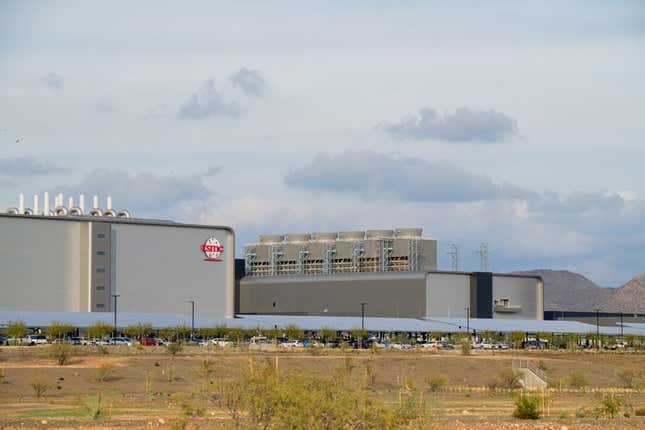
In This Story
The Biden administration has finalized Taiwan Semiconductor Manufacturing Company’s (TSM+0.63%) Chips Act incentive funding to support its U.S. fabrication sites.
The Taiwanese chipmaker signed a preliminary agreement in April for $6.6 billion in grants from the federal Chips and Science Act. The finalized award comes after the U.S. Commerce Department completed its due diligence process. TSMC is also eligible for up to $5 billion in proposed loans.
TSMC will receive at least $1 billion of the total reward this year due to already meeting some of the required benchmarks, Bloomberg reported, citing Biden administration officials. The award will be disbursed as the company’s fabs in Phoenix, Arizona complete certain project milestones.
The federal funding will go toward TSMC’s $65 billion private investment to build three state-of-the-art chipmaking facilities in Phoenix. TSMC already has two planned facilities in Phoenix that are expected to begin production in 2025 and 2028. Some of the funding will support building the third facility.
“This is the largest foreign direct investment in a greenfield project in the history of the United States,” U.S. President Joe Biden said in a statement. “The first of TSMC’s three facilities is on track to fully open early next year, which means that for the first time in decades an America manufacturing plant will be producing the leading-edge chips used in our most advanced technologies – from our smartphones, to autonomous vehicles, to the data centers powering artificial intelligence.”
The finalized funding comes as the Biden administration and chipmakers reportedly rush to complete agreements before the incoming Trump administration. Polar Semiconductor was the first to finish negotiations and finalize its agreement. U.S. chip pioneer Intel (INTC-1.50%) reportedly expects to finalize its $8.5 billion Chips Act grant before the end of the year.
During an appearance on The Joe Rogan Experience, president-elect Donald Trump criticized the Chips Act which was passed by the Biden administration in 2022 — partly to spur domestic advanced chip manufacturing.
“That chip deal is so bad, we put up billions of dollars for rich companies to come and borrow the money and build chip companies here, and they’re not going to give us the good companies anyway,” Trump said on the podcast, adding that the U.S. should instead put tariffs on chips coming into the U.S.
Meanwhile, TSMC’s chip production yields — or the number of functional chips it can produce per manufacturing process — at its Phoenix site are about four percentage points higher than those of comparable fabs in Taiwan, Bloomberg previously reported.
The Biden administration said the Chips Act funding includes a commitment to producing A16 chips in Arizona. In September, independent journalist Tim Culpan reported that TSMC is manufacturing A16 chips for Apple at Phase 1 of its Fab 21 in Phoenix. Production volume of the A16, which was launched in the iPhone 14 Pro in 2022, “will ramp up considerably” after the second stage of TSMC’s Phase 1 fab is finished, Taiwan-based Culpan said. That would put TSMC’s U.S. site on track to reach its target in the first half of next year, he said.